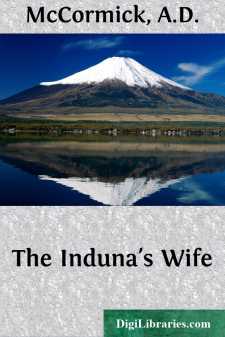Categories
- Antiques & Collectibles 13
- Architecture 36
- Art 48
- Bibles 22
- Biography & Autobiography 813
- Body, Mind & Spirit 142
- Business & Economics 28
- Children's Books 17
- Children's Fiction 14
- Computers 4
- Cooking 94
- Crafts & Hobbies 4
- Drama 346
- Education 46
- Family & Relationships 57
- Fiction 11829
- Games 19
- Gardening 17
- Health & Fitness 34
- History 1377
- House & Home 1
- Humor 147
- Juvenile Fiction 1873
- Juvenile Nonfiction 202
- Language Arts & Disciplines 88
- Law 16
- Literary Collections 686
- Literary Criticism 179
- Mathematics 13
- Medical 41
- Music 40
- Nature 179
- Non-Classifiable 1768
- Performing Arts 7
- Periodicals 1453
- Philosophy 64
- Photography 2
- Poetry 896
- Political Science 203
- Psychology 42
- Reference 154
- Religion 513
- Science 126
- Self-Help 84
- Social Science 81
- Sports & Recreation 34
- Study Aids 3
- Technology & Engineering 59
- Transportation 23
- Travel 463
- True Crime 29
The Induna's Wife
by: A.D. McCormick
Description:
Excerpt
Prologue.
Twilight was fast closing in upon the desolate site of the old Kambúla Camp, and the short, sharp thunderstorm which at the moment of outspanning had effectually drenched the scant supply of fuel, rendering that evening’s repast, of necessity, cold commons, had left in its wake a thin but steady downpour. Already the line of low hills hard by was indistinct in the growing gloom, and a far-reaching expanse of cold and treeless plains made up a surrounding as mournful and depressing as could be.
The waggon stood outspanned in the tall grass, which, waist high, was about as pleasant to stand in as the drift of a river. Just above, the conical ridge, once crested with fort and waggon laagers, and swarming with busy life, and the stir and hum of troops on hard active service, now desolate and abandoned—the site, indeed, still discernible if only by ancient tins, and much fragmentary residue of the ubiquitous British bottle. Below, several dark patches in the grass marked the resting-place of hundreds of Zulu dead—fiery, intrepid warriors—mown down in foil and sweeping rush, with lips still framing the war cry of their king, fierce resolute hands still gripping the deadly charging spear. Now a silent and spectral peace rested upon this erewhile scene of fierce and furious war, a peace that in the gathering gloom had in it something that was weird, boding, oppressive. Even my natives, usually prone to laughter and cheery spirits, seemed subdued, as though loth to pass the night upon this actual site of vast and tolerably recent bloodshed; and the waggon leader, a smart but unimaginative lad, showed a suspicious alacrity in driving back the span from drinking at the adjacent water-hole. Yes! It is going to be a detestable night.
Hard biscuit and canned jam are but a poor substitute for fizzling rashers and wheaten cakes, white as snow within and hot from the gridiron; yet there is a worse one, and that is no biscuit at all. Moreover, there is plenty of whisky, and with that and a pipe I proceed to make myself as snug as may be within the waggon, which is not saying much, for the tent leaks abominably. But life in the Veldt accustoms one to such little inconveniences, and soon, although the night is yet young—has hardly begun, in fact—I find myself nodding, and becoming rapidly and blissfully oblivious to cold splashes dropping incontinently from new and unexpected quarters.
The oxen are not yet made fast to the disselboom for the night, and one of my natives is away to collect them. The others, rolled in their blankets beneath the waggon, are becoming more and more drowsy in the hum of their conversation. Suddenly this becomes wide-awake and alert. They are sitting up, and are, I gather from their remarks, listening to the approach of something or somebody. Who—what is it? There are no wild animals to reckon with in that part of the country, save for a stray leopard or so, and Zulus have a wholesome shrinking from moving abroad at night, let alone on such a night as this....


